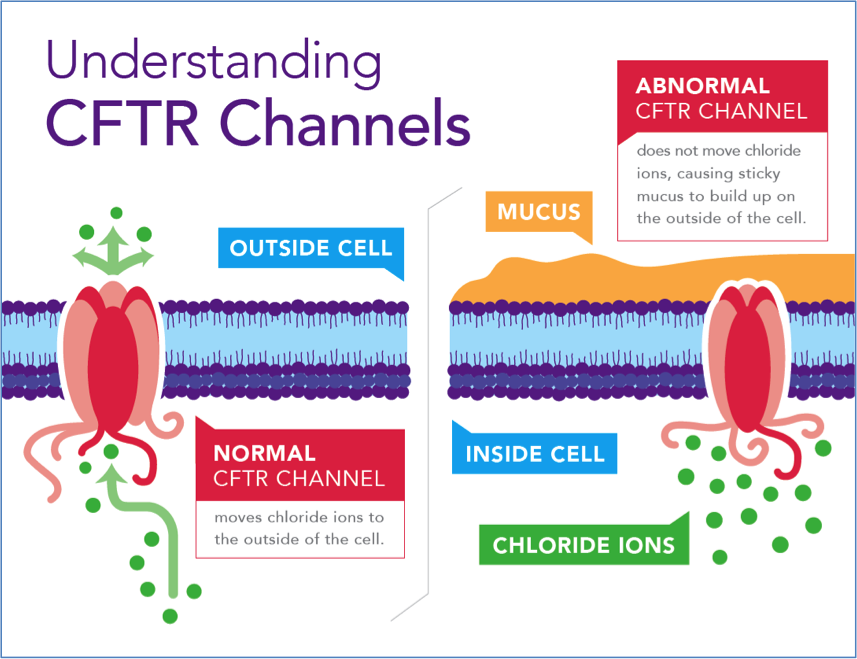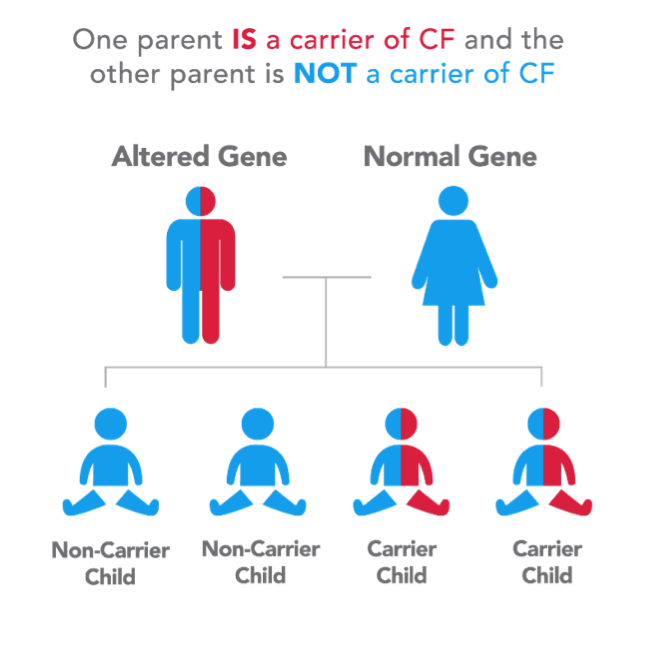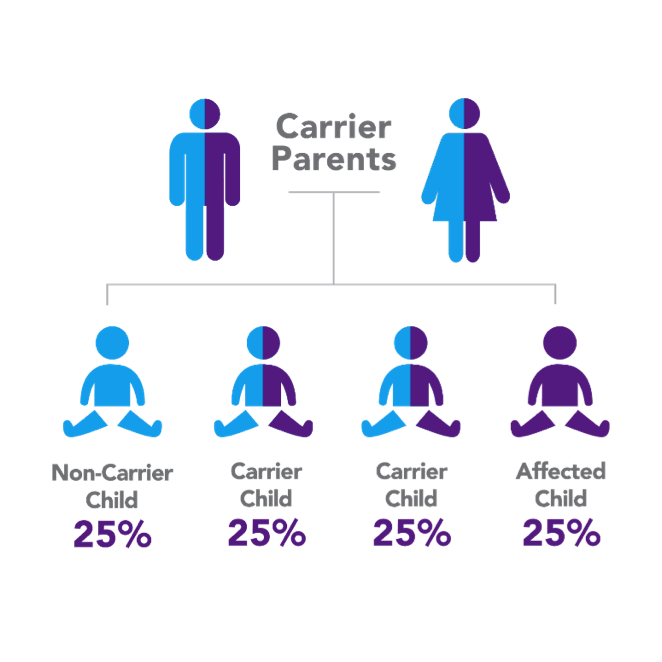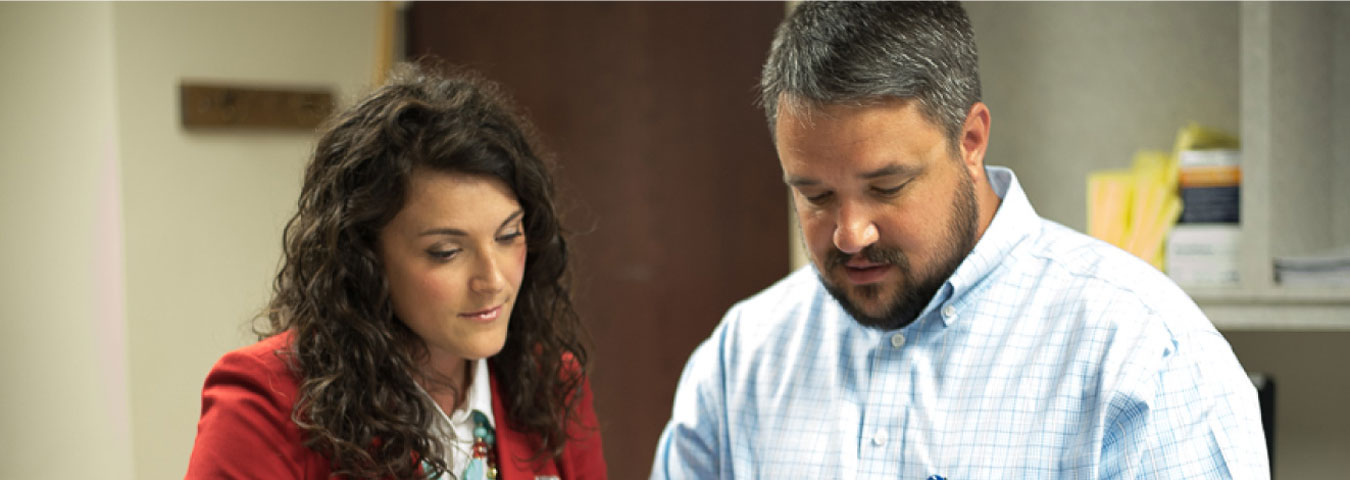Carrier for the CF gene: Information for Caregivers
We know parents worry when they find out their child had a positive newborn screening test for cystic fibrosis (CF). Even though your child most likely does not have CF, you may need to learn about this condition to better understand what it means for your child to be carrier of the CF gene.
What is Cystic Fibrosis?
Cystic fibrosis (CF) is a permanent condition. People with CF look like everyone else, but have health problems. Cystic fibrosis does not affect the brain or how smart a person is. Children with CF go to school, play sports, and get their driver’s license. Adults go to college, have successful jobs, live on their own, and get married. CF does not affect every person the same way so it’s hard to say how mild or severe the condition may be. There is not yet a cure, but there are many treatments. People with CF are living longer, better-quality lives than ever before.
CF is caused by genes that do not work properly. These genes are inherited from each parent. When healthy, the CF gene makes a protein called CFTR. This protein is found in the cells of many organs, like the lungs and the pancreas. CFTR stands for “cystic fibrosis transmembrane regulator”. This protein helps the flow of chloride and sodium (salt and water) in and out of cells. When the CF gene is changed (called a mutation), the CFTR protein in the cells does not work properly. This causes the salt balance in the body to be unequal and leads to very thick mucus. This mucus then blocks the passages in certain parts of the body.
- Lungs/Sinuses: The CF lung is dry and the thick mucus can’t easily be moved or coughed out. In time, the thick mucus builds up and clogs the airways. This can lead to infections and inflammation (swelling) in the lungs. Thick mucus in the sinuses can also cause infections.
- Digestion/Growth: Thick mucus blocks the digestive tract and pancreas. This stops digestive enzymes from getting into the intestines. Enzymes are needed to break down food, which provides nutrients to help people grow and stay healthy.
- Liver, bone health, and reproductive systems: Liver disease, CF-related diabetes, bone mineral issues, and low vitamin levels can also occur. Most men with CF are unable to naturally conceive a child. However, methods now exist to help t this problem. Women with CF may become pregnant, but have special health concerns. They should talk to their doctor if thinking about having a baby.
See Figure 1 showing a normal CFTR protein versus non-working CFTR protein
|
Figure 1 |

Who gets CF?
Around 30,000 people in the United States have CF. It is most common in Caucasians, but it can affect all races. The CF symptoms are different from person to person. Research shows that the severity of CF symptoms is partly based on the types of CF gene mutations. Some mutations are known to cause more severe problems than others. Scientists have found more than 1,900 different mutations of the CF gene.
How do people get cystic fibrosis?
The root cause of CF is genetic. This means people inherit CF from their parents through genes (or DNA). Genes are found in the cells of the body. They give instructions to make proteins. Proteins define how the body looks, grows, and develops.
In CF, cells in parts of the body aren’t working normally due to a change in the CF gene, called mutation. The CF gene mutation then gives wrong instructions to the protein (called CFTR) about how to work. This protein controls the flow of chloride and sodium (elements of salt) in and out of these cells. When the protein doesn’t work properly, as in cystic fibrosis, the salt balance in the body is disturbed. Some changes in the CF gene can cause mild problems, others cause more severe symptoms.
To have cystic fibrosis, a person must inherit two copies of the non-working CF gene - one copy from each parent. Both parents of a child with cystic fibrosis are CF carriers. Being a CF carrier means that someone carries one CF gene mutation, but the other copy of the gene is healthy. A CF carrier will not likely have CF and usually has no signs or symptoms of disease.
How are people a carrier for CF?
For your child to be a carrier, it means that either you or your partner is likely a CF carrier. Because we inherit our genes from our parents, CF carriers can pass on the copy of the CF gene that has a mutation to their children.
- 50% (1 in 2) will be a carrier for the CF gene
- 50% (1 in 2 ) will not have the CF gene
When one parent has a positive CF carrier test and the other parent has a negative CF carrier test, their chances of having a child with CF in the future is low, but not zero. See the Figure 2 below for an example of one carrier parent and how it may affect their children.
|
Figure 2 |

It is also possible that both you and your partner are carriers, even if your baby does not have CF. For this reason, parents who plan to have more children should consider carrier testing to learn more about the chance of having a child with CF.
When two CF carriers have a child together, each time the chances are:
- 25% (1 in 4) the child will have CF;
- 50% (1 in 2) the child will carry the CF gene but not have CF; or
- 25% (1 in 4) the child will not carry the gene and not have CF
See the Figure 3 below for an example of two carrier parents and how that may affect their children.
|
Figure 3 |

Carrier Testing for CF
About one in 29 Caucasians carry one mutation of the CF gene. In other races, one in 46 Hispanic Americans, one in 65 African Americans and one in 90 Asian Americans are carriers of the CF gene.
Arkansas screens all newborns for CF. This is important because catching the condition early leads to prompt treatment and better health in the long run. Adults and older children are not routinely screened for CF, but can choose to be tested.
Since having only one CF gene mutation does not normally cause symptoms, this copy can be passed down to family members without one having the disease. Unless they have a child with CF, most people who are CF carriers do not know it.
Other relatives also have a chance of being carriers of a CF gene mutation. They may wish to know if they could have children with CF or if they are a CF carrier. Genetic carrier testing can be used to tell if a person carries a mutation of the CF gene. The test looks at a person’s DNA (genetic material) and is taken from cells in a blood sample. To learn more about genetic testing, contact your doctor, obstetrician, or genetic counselor.
What does it mean for my child’s future if he or she is a CF carrier?
If your child was found to have one CF gene mutation and had a normal sweat test, it means your child is CF carrier. Children who are carriers of CF do not have or develop CF and typically have no signs or symptoms related to being a carrier. People who are carriers for CF should grow and develop normally. They do not require any medical treatment for cystic fibrosis.
It is important to know your child can pass their non-working CF gene on to their children. Your child’s future children could have CF if their mate also is a CF carrier. Your child should be made aware of this risk when they are old enough to understand genetics and begin to plan for a family.
Resources:
- Cystic Fibrosis Foundation: www.cff.org
- Arkansas Cystic Fibrosis Care Center: www.arkansasCF.com
- Genetics Home Reference summary of cystic fibrosis: http://ghr.nlm.nih.gov/condition/cystic-fibrosis
- Clinical and Functional Translation of CFTR: http://www.cftr2.org/
For more information or questions, please contact the Cystic Fibrosis Center or the Genetics department at Arkansas Children’s Hospital.
Cystic Fibrosis Center: (501) 364-1006
Genetics Department: (501) 364-2966
